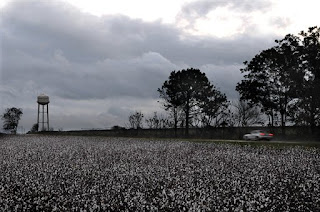You might call it the October quandary for Central
Valley farmers.
There’s no debating we need rain. But growers still working the harvest will
say we don’t need the rain – right now.
For farmers, they’re caught between the proverbial
rock and the hard place, the hammer and anvil or Scyclla and Charybdis. Ok, you
get the message.
 |
| Dark clouds loom over a cotton harvester. |
California is in the midst of an historic five-year
drought and the Golden State certainly welcomes any kind of rainfall. But
growers in the backstretch of the fall harvest would prefer the wet stuff hold
off for a while so they can finish harvesting cotton, sweeping up the last of
the almonds drying on the ground and picking tomatoes and other crops.
“Whenever there
is a change in weather things really pick up,” says almond field scout Jenna
Mayfield. “Everyone is working 12 to 16 hours a day.”
Across the Valley, roadways and highways are buzzing
with farm equipment at harvest time. Machines are moving from field to field or
orchard to orchard. Other equipment is hauling harvested crops to packers or
processors.
The
skies darkened over the weekend as scattered showers fell throughout the
Valley. Madera County received about an inch of rain while neighboring Merced
County received around two-tenths of an inch of rain, according to the National
Weather Service. Fresno only had a trace of rain.
 |
| Threatening skies can worry growers ready to harvest cotton. |
While the rain wasn’t enough to cause major problems
for farmers, the storms did signal a change to cooler day and night
temperatures and unpredictable weather for the rest of the season. The threat
of rain is one more thing to worry growers.
In past years – prior to the drought – we often saw October
storms send Valley growers scrambling to harvest their cotton before rainfall. After
the rains, growers delayed harvesting to allow the fiber and ground dry out.
So what happens if you get soggy cotton? First, it can become mildewy, like a wet towel left rolled up for several days. The lint can get spots or become discolored, which translates in a drop in quality and a cut in revenue.
If there are heavy rains and winds, bolls could drop or the lint could become strung out and fall onto the ground. Wet cotton also can gum up the spindles on the harvesters. It also can clog machinery at the gins. If the ground becomes saturated, the machinery can get stuck.
For almond growers who finished their harvest, windy wet weather still poses a threat right now. Trees remain full of leaves. “We haven’t had a lot of cool days,” Jenna notes.
 |
| Wet leaves and wind can lead to broken tree limbs. |
Jenna also adds the winds have been picking up in the past week. Wet leaves can weigh down limbs and any wind gusts can snap them right off. Trees can even topple. In the long run, broken limbs and branches can add up to a drop in yield next year.
COTTON FARM TOUR: Want to get a
behind-the-scenes look at California cotton production? The Sustainable Cotton
Project’s annual Cotton Farm Tour is scheduled for Friday, October 21. Every
year, dozens of people take advantage of this unique experience, where they can
inspect the crop being harvested, tour a colored cotton field, see a perennial
hedgerow and meet with farmers before visiting a cotton gin. If you can make
it, please join us, and pass the information on to a friend or colleague. You
canregister
hereor
contact SCP Program Director Marcia Gibbs at (530) 370-5325 or Marcia@sustainablecotton.org
for more information.
ALMOND
FIELD DAY: Learn valuable tips about almond tree pruning,
salinity management and controlling navel orangeworm during the fall and winter
months at an October 28 field day in Fresno. The free event will be from 10
a.m. to 12:30 p.m. at the Rushing Ranch, 11599 West Shaw Ave. The featured
speakers are: University of California Cooperative Extension (UCCE) pomologist and almond specialist David Doll of Merced
County; UCCE Fresno County farm advisor Mae Culumber; and UC IPM advisor Kris
Tollerup. You can contact Marcia for more information about the field day.
Continuing education credits have been applied for.
No comments:
Post a Comment